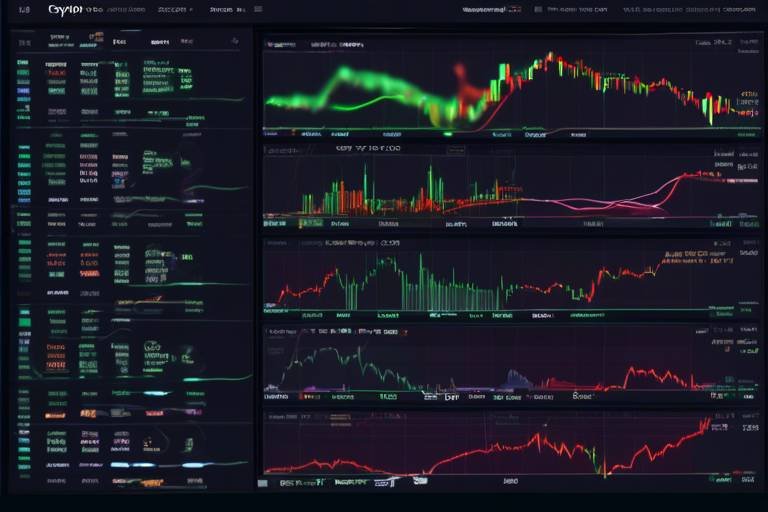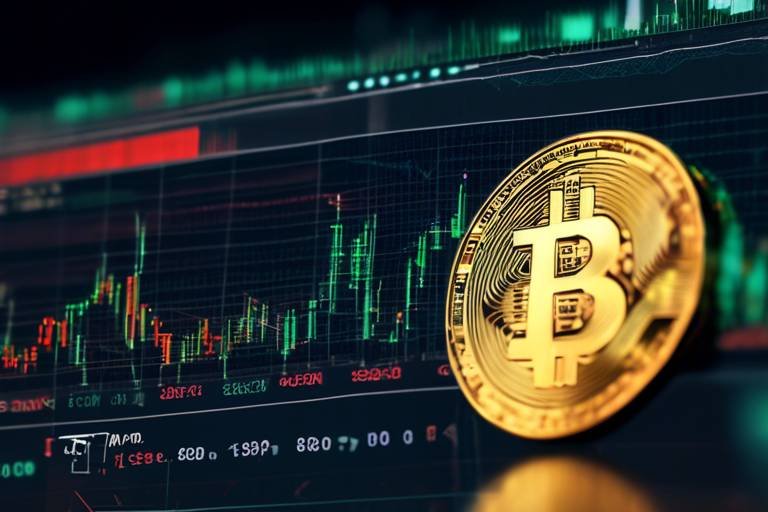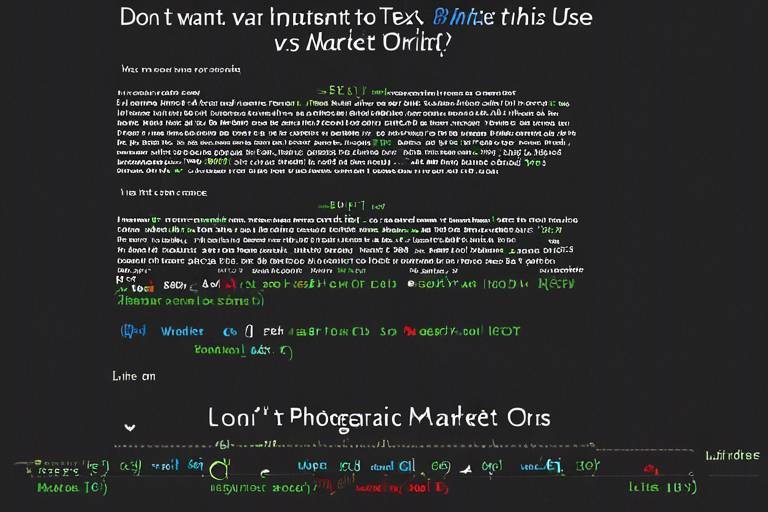The Role of Psychological Biases in Trading
Trading is not just about numbers; it’s a complex dance of emotions, instincts, and decision-making. The financial markets are like a vast ocean, where traders navigate through waves of data, trends, and signals. However, lurking beneath the surface are psychological biases that can significantly impact trading decisions. These biases act like hidden currents, steering traders off course and leading them into turbulent waters. Understanding these biases is essential for anyone looking to improve their trading strategies and outcomes.
Psychological biases are systematic patterns of deviation from norm or rationality in judgment. In the high-stakes world of trading, these biases can result in poor decision-making and substantial financial losses if not recognized and managed effectively. Imagine a seasoned trader who believes they can predict market movements with absolute certainty. This overconfidence can blind them to crucial market signals, leading to impulsive decisions that may jeopardize their portfolio. By acknowledging the presence of these biases, traders can develop more informed strategies and enhance their overall performance.
Common biases like overconfidence, loss aversion, and confirmation bias are prevalent in the trading community. Each of these biases has its own unique characteristics and implications. For instance, overconfidence can lead traders to underestimate risks, while loss aversion can cause them to cling to losing positions in the hope of a turnaround. It’s crucial for traders to identify these patterns in their behavior, as recognizing them is the first step toward mitigating their impact.
Moreover, the emotional aspect of trading cannot be overstated. Emotional regulation plays a vital role in managing the psychological biases that can cloud judgment. Traders must cultivate emotional intelligence to enhance their decision-making processes. Techniques such as mindfulness, journaling, and setting predefined trading rules can serve as lifebuoys, helping traders maintain emotional control amidst the chaos of the markets. Building resilience is equally important, as it enables traders to bounce back from setbacks and maintain a long-term perspective, which is essential for navigating the emotional challenges inherent in trading.
In summary, the role of psychological biases in trading is profound and multifaceted. By understanding and addressing these biases, traders can not only improve their decision-making processes but also enhance their overall trading performance. As the saying goes, “knowledge is power,” and in the world of trading, being aware of the psychological traps that can ensnare even the most seasoned traders is crucial for success.
- What are psychological biases in trading?
Psychological biases are systematic patterns of deviation from rational judgment that can influence trading decisions, often leading to poor outcomes. - How can I identify my trading biases?
Keeping a trading journal, reviewing past trades, and seeking feedback from peers can help you identify and understand your own biases. - What strategies can help mitigate trading biases?
Strategies include adopting a disciplined approach, setting predefined trading rules, and actively seeking diverse perspectives to challenge your assumptions. - Why is emotional regulation important in trading?
Emotional regulation helps traders manage the psychological biases that can cloud judgment, leading to better decision-making and improved trading outcomes.

Understanding Psychological Biases
Psychological biases are fascinating phenomena that play a significant role in how we make decisions, especially in the high-stakes world of trading. These biases are systematic patterns of deviation from norm or rationality in judgment, which means they can lead us down a path of poor decision-making. Imagine you're at a buffet, and even though you know you should eat in moderation, your eyes are bigger than your stomach. You pile your plate high, only to regret it later. This scenario mirrors how biases can inflate our confidence and lead us to make choices that might feel right in the moment but are detrimental in the long run.
In trading, recognizing these biases is crucial. They can manifest in various ways, significantly impacting market behavior and investor performance. For instance, a trader might ignore critical market signals due to an overinflated sense of their predictive abilities, leading to impulsive decisions that can result in significant financial losses. Understanding these biases is not just about acknowledging their existence; it's about actively working to mitigate their effects. This knowledge equips traders with the tools necessary to make more informed choices, ultimately improving their trading strategies.
Consider the following common psychological biases that traders often face:
- Overconfidence Bias: This occurs when traders overestimate their knowledge or predictive capabilities.
- Loss Aversion: Traders may prefer avoiding losses over acquiring equivalent gains, which can distort their decision-making.
- Confirmation Bias: This bias leads traders to seek information that supports their existing beliefs, ignoring contradictory evidence.
Each of these biases can cloud judgment, leading to a cycle of poor decisions and missed opportunities. By understanding the nature of these biases, traders can develop strategies to counteract their negative effects. It's like having a map in a dense forest; without it, you might wander aimlessly, but with it, you can navigate your way to success.

Common Trading Biases
When it comes to trading, our minds can be our best friends or our worst enemies. Psychological biases play a significant role in shaping our decisions, often leading us down paths we might not otherwise choose. These biases are like hidden traps, waiting to ensnare the unwary trader. They can distort our perception of reality, cloud our judgment, and ultimately affect our bottom line. By identifying and understanding these biases, we can better navigate the tumultuous waters of trading.
Among the myriad of biases that affect traders, a few stand out as particularly impactful. Let's delve into some of the most common trading biases that can derail even the most seasoned investors:
- Overconfidence Bias: This bias leads traders to overestimate their own abilities and knowledge. It’s like believing you can conquer a mountain without proper gear—dangerous and often disastrous.
- Loss Aversion: Loss aversion is the fear of losing what you have more than the desire to gain something new. It’s akin to holding onto a sinking ship because you’re afraid of the water.
- Confirmation Bias: This bias causes traders to seek out information that confirms their existing beliefs, ignoring anything that contradicts them. It’s the classic case of only seeing what you want to see.
Each of these biases can lead to irrational decision-making, resulting in missed opportunities or significant losses. For instance, overconfidence might cause a trader to ignore warning signs, leading to poor investment choices. On the other hand, loss aversion can trap traders in losing positions, preventing them from cutting their losses and moving on. Similarly, confirmation bias can create a distorted view of the market, making it hard to adapt to changing conditions.
Understanding these biases is not just an academic exercise; it’s a practical necessity for anyone serious about trading. By recognizing how these biases manifest in our decision-making processes, we can develop strategies to mitigate their effects. This might include setting strict rules for ourselves, seeking feedback from peers, or even employing tools that encourage more objective analysis. The goal is to create a trading environment where rational thought prevails over emotional impulses.
In conclusion, acknowledging the presence of these common trading biases is the first step toward overcoming them. Armed with this knowledge, traders can better position themselves for success in the fast-paced world of trading. Remember, the market is not just a numbers game; it’s a psychological battlefield where understanding your own mind can be your greatest weapon.
Q: What is the most common trading bias?
A: Overconfidence bias is often cited as the most prevalent, leading traders to take excessive risks based on an inflated sense of their own abilities.
Q: How can I identify my own biases?
A: Keeping a trading journal can help. By documenting your trades and the reasoning behind them, you can spot patterns in your decision-making that may reveal biases.
Q: Are there tools to help mitigate trading biases?
A: Yes, there are various analytical tools and software that provide objective data and insights, helping traders make informed decisions rather than emotionally driven ones.

Overconfidence Bias
This article explores how psychological biases influence trading decisions, impacting market behavior and investor performance. Understanding these biases can help traders make more informed choices and improve their overall trading strategies.
Psychological biases are systematic patterns of deviation from norm or rationality in judgment. In trading, these biases can lead to poor decision-making and significant financial losses if not recognized and managed effectively.
Various biases affect traders, such as overconfidence, loss aversion, and confirmation bias. Identifying these common biases is crucial for developing strategies to mitigate their impact on trading performance.
occurs when traders overestimate their knowledge or predictive abilities. Imagine standing on a cliff, convinced you can fly—this is how overconfident traders approach the market. They often believe they possess unique insights that others lack, leading them to take excessive risks. This inflated self-assessment can manifest in various ways, such as:
- Underestimating potential losses
- Ignoring market signals
- Making impulsive trades without thorough analysis
These behaviors can ultimately result in detrimental financial outcomes. The allure of quick profits can blind traders to the reality of their situation, making them vulnerable to significant losses.
Overconfident traders may ignore critical market signals and make impulsive decisions, adversely affecting their overall trading strategy and profitability. For instance, they might enter a position based solely on a hunch rather than solid data, leading to a disconnect between their expectations and the market's actual performance. This dissonance can create a rollercoaster of emotions, where traders oscillate between euphoria and despair, ultimately harming their trading journey.
To counteract overconfidence, traders should adopt a disciplined approach. Here are some strategies that can help:
- Regularly review performance: Keeping a trading journal can provide insights into past decisions and outcomes, helping traders recognize patterns of overconfidence.
- Seek external feedback: Engaging with peers or mentors can offer a fresh perspective on one’s trading strategies and assumptions.
- Set realistic goals: Establishing achievable targets can prevent traders from falling into the trap of unrealistic expectations.
By implementing these strategies, traders can gain a more realistic perspective on their trading abilities and make more informed decisions.
Loss aversion refers to the tendency to prefer avoiding losses over acquiring equivalent gains. This bias can hinder traders from making rational decisions and lead to holding onto losing positions longer than necessary.
Confirmation bias is the tendency to seek out information that supports one’s preexisting beliefs while ignoring contradictory evidence. This can distort a trader's analysis and lead to misguided investment decisions.
Traders influenced by confirmation bias may focus solely on favorable news or data, neglecting critical information that could alter their trading strategy or outlook.
To reduce the effects of confirmation bias, traders should actively seek diverse perspectives, challenge their assumptions, and utilize systematic analysis to make more balanced trading decisions.
Emotional regulation is vital for traders to manage the psychological biases that can cloud judgment. Developing emotional intelligence can enhance decision-making and lead to more successful trading outcomes.
Techniques such as mindfulness, journaling, and setting predefined trading rules can help traders maintain emotional control and reduce the influence of biases on their trading behavior.
Building resilience enables traders to recover from setbacks and maintain a long-term perspective, which is essential for navigating the emotional challenges inherent in trading.
- What is overconfidence bias in trading?
- Overconfidence bias occurs when traders overestimate their knowledge or predictive abilities, leading to excessive risk-taking and poor decision-making.
- How can I combat overconfidence in my trading?
- Regularly reviewing your performance, seeking external feedback, and setting realistic goals can help mitigate overconfidence.
- Why is emotional regulation important in trading?
- Emotional regulation helps traders manage psychological biases that can cloud judgment, leading to better decision-making and improved trading outcomes.

Impact on Decision-Making
The impact of overconfidence bias on decision-making in trading can be profound and often detrimental. When traders fall into the trap of believing they possess superior knowledge or skills, they tend to overlook critical data and market signals. This overestimation of their abilities can lead to a series of impulsive decisions that not only jeopardize their investments but also distort their overall trading strategy. Imagine a seasoned sailor who, despite a storm brewing on the horizon, insists on navigating through it because they believe they can handle the waves. This analogy perfectly encapsulates how overconfident traders might approach the market, ignoring the warning signs that could save them from significant losses.
Furthermore, overconfident traders may engage in excessive risk-taking, often investing larger sums than they should or diversifying their portfolios inappropriately. This reckless behavior can create a false sense of security, resulting in a dangerous cycle where losses are rationalized, and poor choices are repeated. The table below illustrates how overconfidence can lead traders to make decisions that deviate from rational investment practices:
| Overconfidence Behavior | Potential Consequences |
|---|---|
| Ignoring market trends | Missed opportunities and increased losses |
| Taking larger positions than warranted | Heightened exposure to risk and volatility |
| Refusing to accept losses | Holding onto losing trades too long |
| Neglecting research | Informed decision-making suffers |
In essence, the psychological bias of overconfidence can lead traders to make decisions that are not only impulsive but also misaligned with sound trading principles. To combat this, it is essential for traders to implement strategies that encourage a more disciplined approach to trading. Regularly reviewing their performance, seeking feedback, and maintaining a humble perspective can help mitigate the adverse effects of overconfidence. By doing so, traders can enhance their decision-making processes and ultimately improve their trading outcomes.
- What is overconfidence bias in trading? Overconfidence bias occurs when traders overestimate their knowledge or predictive abilities, leading to poor decision-making and increased risk-taking.
- How can I recognize overconfidence in my trading? If you find yourself ignoring market signals, taking larger risks than usual, or justifying losses, you may be experiencing overconfidence bias.
- What strategies can help mitigate overconfidence? Regular performance reviews, seeking external feedback, and maintaining a disciplined trading approach can help counteract overconfidence.
- Why is emotional regulation important in trading? Emotional regulation helps traders manage psychological biases, leading to better decision-making and improved trading outcomes.

Strategies to Combat Overconfidence
This article explores how psychological biases influence trading decisions, impacting market behavior and investor performance. Understanding these biases can help traders make more informed choices and improve their overall trading strategies.
Psychological biases are systematic patterns of deviation from norm or rationality in judgment. In trading, these biases can lead to poor decision-making and significant financial losses if not recognized and managed effectively.
Various biases affect traders, such as overconfidence, loss aversion, and confirmation bias. Identifying these common biases is crucial for developing strategies to mitigate their impact on trading performance.
Overconfidence bias occurs when traders overestimate their knowledge or predictive abilities. This can lead to excessive risk-taking and poor investment choices, ultimately resulting in detrimental financial outcomes.
Overconfident traders may ignore critical market signals and make impulsive decisions, adversely affecting their overall trading strategy and profitability.
To effectively combat overconfidence, traders must adopt a disciplined approach to their trading practices. One effective strategy is to regularly review their performance. By analyzing past trades, traders can identify patterns of overconfidence and learn from their mistakes. This self-reflection is crucial for gaining a more realistic perspective on their trading abilities.
Additionally, seeking external feedback can provide valuable insights. Engaging with mentors or fellow traders allows individuals to receive constructive criticism and diverse viewpoints. This can help traders recognize when their confidence may be unwarranted and encourage them to adjust their strategies accordingly.
Another useful technique is to set predefined trading rules that limit risk exposure. For instance, traders can establish strict stop-loss orders to prevent emotional decision-making during market fluctuations. By adhering to these rules, traders can reduce the likelihood of making impulsive trades based on overconfidence.
Moreover, incorporating mindfulness practices into daily routines can enhance emotional awareness. Techniques such as meditation or focused breathing can help traders stay grounded and maintain clarity in their decision-making processes. This heightened awareness can serve as a buffer against the impulsive tendencies that overconfidence often brings.
Lastly, it’s essential for traders to remember that the market is inherently unpredictable. Embracing a mindset of continuous learning can foster humility and keep overconfidence in check. By recognizing that there is always more to learn, traders can approach the market with a more balanced perspective.
Loss aversion refers to the tendency to prefer avoiding losses over acquiring equivalent gains. This bias can hinder traders from making rational decisions and lead to holding onto losing positions longer than necessary.
Confirmation bias is the tendency to seek out information that supports one’s preexisting beliefs while ignoring contradictory evidence. This can distort a trader's analysis and lead to misguided investment decisions.
Traders influenced by confirmation bias may focus solely on favorable news or data, neglecting critical information that could alter their trading strategy or outlook.
To reduce the effects of confirmation bias, traders should actively seek diverse perspectives, challenge their assumptions, and utilize systematic analysis to make more balanced trading decisions.
Emotional regulation is vital for traders to manage the psychological biases that can cloud judgment. Developing emotional intelligence can enhance decision-making and lead to more successful trading outcomes.
Techniques such as mindfulness, journaling, and setting predefined trading rules can help traders maintain emotional control and reduce the influence of biases on their trading behavior.
Building resilience enables traders to recover from setbacks and maintain a long-term perspective, which is essential for navigating the emotional challenges inherent in trading.
- What is overconfidence bias in trading?
Overconfidence bias occurs when traders overestimate their abilities and knowledge, leading to risky decisions. - How can I recognize my trading biases?
Regular performance reviews and seeking feedback from peers can help identify personal biases. - What techniques can help with emotional regulation?
Mindfulness practices, journaling, and setting strict trading rules are effective techniques for emotional regulation. - Why is it important to combat psychological biases?
Combating psychological biases can lead to better decision-making, improved trading strategies, and ultimately, greater financial success.

Loss Aversion
Loss aversion is a fascinating psychological bias that significantly impacts trading decisions. It refers to the tendency of individuals to prefer avoiding losses rather than acquiring equivalent gains. In simpler terms, the pain of losing money is felt more intensely than the pleasure of making money. This bias can lead traders to make irrational choices, often resulting in prolonged periods of holding onto losing positions instead of cutting their losses and moving on.
Imagine you're at a casino. You’ve just lost $100 on a game. The emotional response to that loss is strong, isn’t it? Now, think about how hard it would be to walk away from that table without trying to win back your money. This scenario mirrors what many traders experience in the stock market. The fear of loss can be paralyzing, causing them to cling to underperforming stocks in hopes that they will eventually rebound, a phenomenon often referred to as "throwing good money after bad."
Research shows that loss aversion can lead to significant financial consequences. Traders may hold onto losing investments far too long, convinced that a turnaround is just around the corner. This behavior not only locks up capital but also increases the risk of further losses. On the flip side, the fear of losing can prevent traders from entering potentially profitable trades, as they become overly cautious and miss out on opportunities.
To illustrate the impact of loss aversion, let's look at a brief example:
| Scenario | Outcome |
|---|---|
| Trader A holds onto a stock that has dropped 30% in value, hoping it will recover. | Continues to lose money as the stock declines further. |
| Trader B sells a stock after a 10% drop, accepting a small loss. | Reinvests the capital into a more promising opportunity. |
This table highlights how loss aversion can lead to vastly different outcomes for traders. Trader A's emotional attachment to the losing stock results in a deeper financial hole, while Trader B's acceptance of a small loss allows for future growth.
To combat loss aversion, traders can adopt several strategies. One effective approach is to set strict stop-loss orders. By determining in advance how much loss is acceptable, traders can limit their emotional involvement in the decision-making process. Additionally, maintaining a trading journal can help traders reflect on their decisions and recognize patterns of behavior driven by loss aversion.
Ultimately, understanding loss aversion is crucial for traders looking to improve their performance. By acknowledging this bias and implementing strategies to counteract its effects, traders can make more rational decisions, minimize losses, and seize opportunities that might otherwise be overlooked.
- What is loss aversion? Loss aversion is the psychological tendency to prefer avoiding losses over acquiring equivalent gains, which can lead to irrational trading behavior.
- How does loss aversion affect trading decisions? It can cause traders to hold onto losing positions longer than necessary and avoid entering potentially profitable trades due to fear of loss.
- What strategies can help mitigate loss aversion? Setting stop-loss orders, maintaining a trading journal, and developing a disciplined trading plan can help traders manage loss aversion effectively.

Confirmation Bias
is a fascinating psychological phenomenon that significantly impacts trading decisions. It refers to the tendency of traders to seek out, interpret, and remember information in a way that confirms their preexisting beliefs or hypotheses. This bias can create a distorted view of the market, leading to misguided investment choices. Imagine a trader who believes that a particular stock will rise; they might only focus on news articles and analyses that support this belief while ignoring any negative reports or data that could suggest otherwise. This selective perception can be detrimental, as it prevents traders from making well-rounded and informed decisions.
In the fast-paced world of trading, the stakes are high, and the consequences of confirmation bias can be severe. Traders influenced by this bias may find themselves holding onto losing positions longer than they should, convinced that the market will eventually align with their expectations. This can lead to significant financial losses, as they miss opportunities to cut their losses and reallocate their investments to more promising ventures.
To illustrate the impact of confirmation bias, consider a hypothetical scenario involving two traders, Alex and Jamie. Alex believes that a tech company is on the verge of a breakthrough and only reads positive news about the company. Meanwhile, Jamie, who is skeptical of the tech company, seeks out a variety of opinions and data, including negative reports. As a result, Jamie makes a more informed decision to invest elsewhere, while Alex clings to his initial belief and suffers losses when the company's stock price drops. This example highlights how confirmation bias can lead to poor decision-making and missed opportunities.
So, how can traders combat confirmation bias? One effective strategy is to actively seek out diverse perspectives. This means challenging one's assumptions and engaging with information that contradicts one's beliefs. By doing so, traders can gain a more balanced view of the market and make decisions based on a comprehensive analysis rather than a narrow focus on supporting evidence. Additionally, utilizing systematic analysis methods, such as technical and fundamental analysis, can help traders evaluate their positions more objectively.
Ultimately, recognizing and mitigating confirmation bias is crucial for traders aiming to improve their decision-making processes. By embracing a more open-minded approach and being willing to question their beliefs, traders can enhance their ability to navigate the complexities of the financial markets. This not only leads to better trading outcomes but also fosters a culture of continuous learning and adaptation, which is essential for long-term success in trading.
- What is confirmation bias? Confirmation bias is the tendency to favor information that confirms existing beliefs while disregarding contradictory evidence.
- How does confirmation bias affect trading? It can lead traders to make poor investment decisions by focusing only on favorable information and ignoring critical data.
- What are some strategies to mitigate confirmation bias? Actively seeking diverse perspectives, challenging assumptions, and using systematic analysis can help reduce the effects of confirmation bias.
- Why is emotional regulation important in trading? Emotional regulation helps traders manage their psychological biases, leading to better decision-making and improved trading outcomes.

Impact on Research and Analysis
This article explores how psychological biases influence trading decisions, impacting market behavior and investor performance. Understanding these biases can help traders make more informed choices and improve their overall trading strategies.
Psychological biases are systematic patterns of deviation from norm or rationality in judgment. In trading, these biases can lead to poor decision-making and significant financial losses if not recognized and managed effectively.
Various biases affect traders, such as overconfidence, loss aversion, and confirmation bias. Identifying these common biases is crucial for developing strategies to mitigate their impact on trading performance.
Overconfidence bias occurs when traders overestimate their knowledge or predictive abilities. This can lead to excessive risk-taking and poor investment choices, ultimately resulting in detrimental financial outcomes.
Overconfident traders may ignore critical market signals and make impulsive decisions, adversely affecting their overall trading strategy and profitability.
To counteract overconfidence, traders should adopt a disciplined approach, regularly review their performance, and seek external feedback to gain a more realistic perspective on their trading abilities.
Loss aversion refers to the tendency to prefer avoiding losses over acquiring equivalent gains. This bias can hinder traders from making rational decisions and lead to holding onto losing positions longer than necessary.
Confirmation bias is the tendency to seek out information that supports one’s preexisting beliefs while ignoring contradictory evidence. This can distort a trader's analysis and lead to misguided investment decisions.
Traders influenced by confirmation bias often find themselves in a precarious position when it comes to their research and analysis. This bias can warp their approach to gathering and interpreting data, leading to a skewed understanding of market conditions. For instance, if a trader believes strongly in a particular stock's potential, they might only focus on positive news and data, completely disregarding any negative indicators that could signal a downturn.
This selective attention can create a false sense of security, causing traders to make decisions based on incomplete information. The impact is not just limited to individual trades; it can also affect overall market behavior. When many traders fall prey to confirmation bias, it can lead to market bubbles or crashes as collective decisions are based on flawed analyses.
To illustrate the potential ramifications of confirmation bias, consider the following table:
| Type of Information | Influence on Trading Decisions |
|---|---|
| Positive News | Increased buying pressure, leading to inflated prices. |
| Negative News | Ignored or downplayed, resulting in prolonged losses. |
Moreover, confirmation bias can hinder a trader’s ability to adapt to changing market conditions. When traders cling to their preexisting beliefs, they often miss out on critical shifts that could inform their strategies. This can be likened to driving with blinders on; while you may be focused on a specific path, you’re oblivious to potential obstacles or alternative routes that could lead to better outcomes.
To combat the detrimental effects of confirmation bias, traders should actively seek out diverse perspectives and challenge their own assumptions. Engaging in systematic analysis—where data is evaluated without preconceived notions—can help create a more balanced view of the market. By doing so, traders not only enhance their research and analysis but also position themselves for more informed and rational decision-making.
Emotional regulation is vital for traders to manage the psychological biases that can cloud judgment. Developing emotional intelligence can enhance decision-making and lead to more successful trading outcomes.
Techniques such as mindfulness, journaling, and setting predefined trading rules can help traders maintain emotional control and reduce the influence of biases on their trading behavior.
Building resilience enables traders to recover from setbacks and maintain a long-term perspective, which is essential for navigating the emotional challenges inherent in trading.
- What are psychological biases in trading? Psychological biases are systematic patterns of deviation from rational judgment that can affect trading decisions.
- How can I identify my biases? Regular self-reflection, performance reviews, and seeking feedback from others can help identify biases.
- What strategies can mitigate trading biases? Techniques such as systematic analysis, emotional regulation, and seeking diverse perspectives can help mitigate biases.

Mitigating Confirmation Bias
Mitigating confirmation bias is crucial for traders who wish to enhance their decision-making process and avoid the pitfalls of distorted analysis. This bias can lead to a narrow focus on information that aligns with preexisting beliefs, often resulting in missed opportunities or misguided investments. To combat this tendency, traders should actively engage in practices that encourage a more balanced perspective. One effective approach is to seek diverse perspectives. By discussing strategies and market insights with fellow traders or mentors, individuals can gain insights that challenge their assumptions and broaden their understanding of the market dynamics.
Another practical technique involves challenging assumptions. Traders should regularly question their own views and consider alternative scenarios. For instance, if a trader believes a stock is undervalued, they should actively look for information that suggests otherwise, rather than solely focusing on data that supports their initial belief. This practice not only fosters a more comprehensive analysis but also helps in making informed decisions based on a wider range of evidence.
Utilizing systematic analysis is also key to reducing confirmation bias. Traders can implement structured frameworks for evaluating their investments, which include predefined criteria for entry and exit points. By relying on data-driven methods rather than gut feelings, traders can minimize the influence of biases on their trading behavior. Additionally, keeping a trading journal can serve as a valuable tool for reflection. Documenting trades, the rationale behind decisions, and the outcomes can help traders identify patterns in their thinking and recognize instances of confirmation bias.
Moreover, it’s beneficial to incorporate a feedback loop into one’s trading routine. Seeking feedback from peers or utilizing performance analytics can provide a reality check and highlight areas where biases may have skewed judgment. This practice not only promotes accountability but also encourages continuous learning and adaptation, which are essential in the ever-evolving trading landscape.
In summary, mitigating confirmation bias requires a proactive approach that encompasses seeking diverse opinions, challenging personal assumptions, employing systematic analysis, and incorporating feedback. By embracing these strategies, traders can cultivate a more objective mindset, leading to improved trading decisions and enhanced performance in the market.
- What is confirmation bias?
Confirmation bias is the tendency to favor information that confirms one’s existing beliefs while disregarding evidence that contradicts those beliefs. - How can I identify confirmation bias in my trading?
Look for patterns where you only seek out information that supports your trades or strategies, while ignoring data that may suggest a different approach. - Why is it important to mitigate confirmation bias?
Mitigating confirmation bias is essential for making informed and rational trading decisions, which can lead to better investment outcomes. - What techniques can help reduce confirmation bias?
Techniques include seeking diverse perspectives, challenging your assumptions, utilizing systematic analysis, and maintaining a trading journal.

The Importance of Emotional Regulation
In the fast-paced world of trading, emotional regulation plays a crucial role in ensuring that traders can make sound decisions. When emotions run high, it’s easy to fall prey to psychological biases that can cloud judgment and lead to poor choices. Imagine trying to navigate a stormy sea without a compass; that’s what trading can feel like when emotions take over. By developing emotional intelligence, traders can better manage their feelings, leading to improved decision-making and more successful trading outcomes.
Emotional regulation is not just about suppressing feelings; it’s about understanding and managing them effectively. When traders experience fear, greed, or frustration, these emotions can significantly impact their trading strategies. For instance, a trader who is afraid of losing money might hold onto a failing investment longer than necessary, while another might jump into a trade out of sheer excitement, ignoring critical market signals. Therefore, cultivating the ability to regulate emotions is essential for maintaining a clear and rational mindset.
To illustrate the importance of emotional regulation, consider the following table that highlights the effects of various emotional states on trading behavior:
| Emotional State | Impact on Trading | Potential Outcome |
|---|---|---|
| Fear | Overly cautious, may avoid necessary risks | Missed opportunities for profit |
| Greed | Overtrading and taking excessive risks | Significant financial losses |
| Frustration | Impulsive decisions, revenge trading | Increased volatility in trading performance |
By recognizing these emotional states and their potential impacts, traders can take proactive steps to mitigate their effects. Techniques such as mindfulness, which encourages being present and aware of one’s feelings, can be particularly beneficial. Mindfulness allows traders to pause and reflect before making decisions, helping to create a buffer against impulsive actions driven by emotion.
Another effective technique is journaling. Keeping a trading journal where emotions, decisions, and outcomes are recorded can provide valuable insights into patterns of behavior. By reviewing past trades, traders can identify instances where emotions influenced their decisions and learn to adjust their strategies accordingly. This practice not only fosters self-awareness but also encourages accountability in one’s trading journey.
Setting predefined trading rules is another strategy that can help maintain emotional control. By establishing clear guidelines for entering and exiting trades, traders can reduce the influence of emotions on their decisions. For example, a trader might decide to exit a position if it reaches a certain loss threshold, regardless of their emotional attachment to the trade. This disciplined approach can lead to more consistent trading performance over time.
Finally, building resilience is vital for traders to bounce back from setbacks. The trading landscape is often unpredictable, and losses are an inevitable part of the journey. Traders who develop resilience can maintain a long-term perspective, focusing on their overall strategy rather than getting bogged down by individual losses. This mindset shift can transform challenges into learning opportunities, ultimately leading to greater success in the trading arena.
- What is emotional regulation in trading?
Emotional regulation refers to the ability to manage and respond to one’s emotions in a healthy way, especially in high-pressure situations like trading. - Why is emotional regulation important for traders?
It helps traders make more rational decisions, minimizes the impact of psychological biases, and leads to better overall trading performance. - What techniques can improve emotional regulation?
Techniques such as mindfulness, journaling, and setting predefined trading rules can enhance emotional regulation and decision-making.

Techniques for Emotional Regulation
This article explores how psychological biases influence trading decisions, impacting market behavior and investor performance. Understanding these biases can help traders make more informed choices and improve their overall trading strategies.
Psychological biases are systematic patterns of deviation from norm or rationality in judgment. In trading, these biases can lead to poor decision-making and significant financial losses if not recognized and managed effectively.
Various biases affect traders, such as overconfidence, loss aversion, and confirmation bias. Identifying these common biases is crucial for developing strategies to mitigate their impact on trading performance.
Overconfidence bias occurs when traders overestimate their knowledge or predictive abilities. This can lead to excessive risk-taking and poor investment choices, ultimately resulting in detrimental financial outcomes.
Overconfident traders may ignore critical market signals and make impulsive decisions, adversely affecting their overall trading strategy and profitability.
To counteract overconfidence, traders should adopt a disciplined approach, regularly review their performance, and seek external feedback to gain a more realistic perspective on their trading abilities.
Loss aversion refers to the tendency to prefer avoiding losses over acquiring equivalent gains. This bias can hinder traders from making rational decisions and lead to holding onto losing positions longer than necessary.
Confirmation bias is the tendency to seek out information that supports one’s preexisting beliefs while ignoring contradictory evidence. This can distort a trader's analysis and lead to misguided investment decisions.
Traders influenced by confirmation bias may focus solely on favorable news or data, neglecting critical information that could alter their trading strategy or outlook.
To reduce the effects of confirmation bias, traders should actively seek diverse perspectives, challenge their assumptions, and utilize systematic analysis to make more balanced trading decisions.
Emotional regulation is vital for traders to manage the psychological biases that can cloud judgment. Developing emotional intelligence can enhance decision-making and lead to more successful trading outcomes.
Emotional regulation is essential for traders looking to maintain composure in the fast-paced world of trading. Implementing various techniques can significantly enhance a trader's ability to manage their emotions and make sound decisions. One effective technique is mindfulness, which involves being present in the moment and acknowledging feelings without judgment. This practice helps traders observe their emotions rather than react impulsively to them.
Another beneficial method is journaling. By keeping a trading journal, traders can document their thoughts, feelings, and decisions during trades. This not only provides insight into emotional triggers but also allows for reflection on past trades, helping to identify patterns of behavior that may lead to biased decision-making.
Additionally, setting predefined trading rules can create a structured approach that minimizes emotional interference. These rules can include stop-loss limits, profit-taking strategies, and criteria for entering or exiting trades. When emotions run high, having a clear set of guidelines can help traders stick to their plan and avoid making hasty decisions based on fear or greed.
Furthermore, incorporating regular breaks into trading sessions can provide traders with the necessary space to recalibrate emotionally. Just as athletes need rest to perform at their best, traders benefit from stepping back to reassess their mindset and strategy. This break can be as simple as a short walk or a few minutes of deep breathing, allowing for a mental reset.
In summary, by utilizing techniques such as mindfulness, journaling, setting predefined rules, and taking breaks, traders can enhance their emotional regulation. This, in turn, helps to mitigate the influence of psychological biases and leads to more balanced and rational trading decisions.
- What are psychological biases in trading?
Psychological biases are systematic patterns that affect traders' judgments and decisions, often leading to irrational behavior and financial losses. - How can I identify my trading biases?
Keeping a trading journal and reflecting on your decisions can help you recognize patterns of behavior that indicate biases. - What is loss aversion, and why is it important?
Loss aversion is the tendency to prefer avoiding losses over acquiring gains. It's important because it can lead to poor decision-making, such as holding onto losing trades too long. - How does emotional regulation improve trading performance?
Emotional regulation helps traders manage their emotions, leading to better decision-making and reduced influence of psychological biases.

Building Resilience
This article explores how psychological biases influence trading decisions, impacting market behavior and investor performance. Understanding these biases can help traders make more informed choices and improve their overall trading strategies.
Psychological biases are systematic patterns of deviation from norm or rationality in judgment. In trading, these biases can lead to poor decision-making and significant financial losses if not recognized and managed effectively.
Various biases affect traders, such as overconfidence, loss aversion, and confirmation bias. Identifying these common biases is crucial for developing strategies to mitigate their impact on trading performance.
Overconfidence bias occurs when traders overestimate their knowledge or predictive abilities. This can lead to excessive risk-taking and poor investment choices, ultimately resulting in detrimental financial outcomes.
Overconfident traders may ignore critical market signals and make impulsive decisions, adversely affecting their overall trading strategy and profitability.
To counteract overconfidence, traders should adopt a disciplined approach, regularly review their performance, and seek external feedback to gain a more realistic perspective on their trading abilities.
Loss aversion refers to the tendency to prefer avoiding losses over acquiring equivalent gains. This bias can hinder traders from making rational decisions and lead to holding onto losing positions longer than necessary.
Confirmation bias is the tendency to seek out information that supports one’s preexisting beliefs while ignoring contradictory evidence. This can distort a trader's analysis and lead to misguided investment decisions.
Traders influenced by confirmation bias may focus solely on favorable news or data, neglecting critical information that could alter their trading strategy or outlook.
To reduce the effects of confirmation bias, traders should actively seek diverse perspectives, challenge their assumptions, and utilize systematic analysis to make more balanced trading decisions.
Emotional regulation is vital for traders to manage the psychological biases that can cloud judgment. Developing emotional intelligence can enhance decision-making and lead to more successful trading outcomes.
Techniques such as mindfulness, journaling, and setting predefined trading rules can help traders maintain emotional control and reduce the influence of biases on their trading behavior.
Building resilience is an essential skill for traders, allowing them to bounce back from setbacks and maintain a long-term perspective. Just like a rubber band that stretches but returns to its original shape, resilient traders can withstand the pressures of the market without losing their core principles. When faced with losses, resilient traders don't dwell on the negative; instead, they analyze what went wrong and learn from it. This ability to adapt and learn is what separates successful traders from those who struggle.
Moreover, resilience involves cultivating a positive mindset. Traders can practice reframing their thoughts, viewing challenges as opportunities rather than obstacles. For instance, instead of seeing a loss as a failure, they can view it as a valuable lesson that brings them closer to mastery. This shift in perspective can significantly enhance trading performance.
To foster resilience, traders can implement several strategies:
- Develop a Support Network: Surrounding oneself with other traders can provide emotional support and valuable insights. Sharing experiences can help traders feel less isolated in their challenges.
- Set Realistic Goals: Establishing achievable objectives can prevent feelings of overwhelm and disappointment, allowing traders to celebrate small victories along the way.
- Practice Self-Care: Maintaining physical and mental well-being is crucial. Regular exercise, healthy eating, and adequate rest can improve focus and decision-making abilities.
Ultimately, building resilience is about creating a strong foundation that can weather the storms of trading. By embracing challenges, learning from mistakes, and maintaining a supportive environment, traders can enhance their performance and thrive in the ever-changing landscape of the markets.
- What are psychological biases in trading?
Psychological biases are systematic patterns of deviation from rational judgment that can lead to poor trading decisions. - How can I identify my trading biases?
Regular self-reflection, performance reviews, and seeking feedback from peers can help in identifying personal biases. - What techniques can improve emotional regulation in trading?
Techniques such as mindfulness, journaling, and setting predefined trading rules can enhance emotional control. - Why is resilience important for traders?
Resilience helps traders recover from setbacks and maintain a long-term perspective, which is vital for success in trading.
Frequently Asked Questions
- What are psychological biases in trading?
Psychological biases in trading refer to systematic patterns of deviation from rational judgment that can affect decision-making. These biases can lead traders to make poor choices, often resulting in financial losses.
- How does overconfidence bias affect trading?
Overconfidence bias can lead traders to overestimate their knowledge and predictive abilities. This often results in excessive risk-taking and impulsive decisions, which can adversely impact their trading strategy and profitability.
- What is loss aversion and how does it impact traders?
Loss aversion is the tendency to prefer avoiding losses over acquiring equivalent gains. This bias can cause traders to hold onto losing positions for too long, preventing them from making more rational decisions and potentially leading to greater losses.
- What is confirmation bias in trading?
Confirmation bias occurs when traders seek out information that supports their preexisting beliefs while ignoring contradictory evidence. This can distort their analysis and lead to misguided investment decisions, affecting overall trading performance.
- How can traders mitigate the effects of confirmation bias?
To mitigate confirmation bias, traders should actively seek diverse perspectives, challenge their assumptions, and use systematic analysis to ensure a balanced approach to decision-making.
- Why is emotional regulation important for traders?
Emotional regulation is crucial for traders to manage psychological biases that can cloud their judgment. By developing emotional intelligence, traders can enhance their decision-making processes and improve their overall trading outcomes.
- What techniques can help with emotional regulation in trading?
Techniques such as mindfulness, journaling, and setting predefined trading rules can help traders maintain emotional control, reducing the influence of biases on their trading behavior.
- How does building resilience benefit traders?
Building resilience allows traders to recover from setbacks and maintain a long-term perspective. This is essential for navigating the emotional challenges that come with trading, helping them stay focused and disciplined.



















